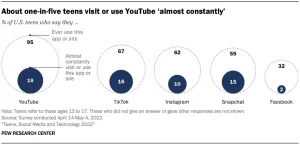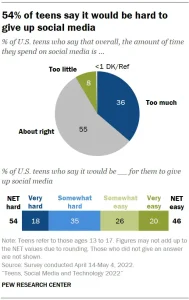The Impact of Social Media on Youth: How to Make a Difference
Introduction
With the rapid advancement of technology, the use of social media has become an inseparable part of our daily lives. We log in, scroll through our feeds, and stay connected with others regularly. It has become the go-to destination for sharing experiences, opinions, and accessing information. However, the growing popularity of social media has sparked a debate on the Impact of social media on Youth.
Do social media consume our youth? What is the long-term effect on their mental and emotional well-being? What are the Positive and Negative impacts of social media on Youth?
Here in this article, we will uncover the various ways in which social media is transforming the lives of our youth and explore how we can make the most of this new technological landscape while mitigating its potential impact.
Agenda for this article on The Impact of social media on Youth:
Overview
Social media platforms like Facebook, Instagram, Twitter, and YouTube have revolutionized the way we communicate, access information, and consume entertainment. The youth, in particular, have embraced social media with open arms.
According to a report by the Pew Research Center, Social Media Use in 2021, YouTube and Facebook continue to dominate the online landscape, with 81% and 69%, respectively.
A report in 2022 says that 54% of teens believe it would be difficult to quit social media, while 46% say it would be easy. This statistic shows the Impact of social media on Youth.
As per a recent report by Common Sense Media, the impact of social media on teens has been a topic of debate. The report surveyed 1,500 young individuals and revealed intriguing results. A whopping 50% of teens considered social media an integral source of support, advice, creative expression, and combating loneliness.
Additionally, 43% of them also mentioned using social media to cope with feelings of depression, stress, or anxiety. These staggering figures highlight how social media has become a vital part of teens’ lives and their emotional well-being.
Shockingly, a 2018 study found that teenagers between the ages of 14 and 17 who spent seven hours or more on social media had a heightened risk of being diagnosed with depression, receiving treatment from a mental health professional, or needing medication for psychological or behavioral issues within the last year.
According to surveys of US adolescents, teen depression symptoms and suicide rates increased significantly between 2010 and 2015. Another survey expressed concerns about online social networking and Depression among high school students’ behavioral physiology perspectives.
Social media usage has both positive and negative impacts on youth. It can be used as a platform for communication, knowledge sharing, and self-expression, but it can also lead to addiction, cyberbullying, and privacy issues. It is important to understand the impact that social media can have on young people to ensure that it is used responsibly and safely.
Positive Impact of Social Media on Youth
1) Improved Communication:
Social Media has made communication faster, more accessible, and more affordable. It’s now easier than ever for youth to stay connected with their loved ones, regardless of distance. With just a few clicks, they can chat, video call, or even share pictures and videos with family, friends, and acquaintances all over the world.
Social media has created a global community that brings people together, making the world feel like a smaller, more interconnected place.
2) Enhanced Creativity:
We’re living in a time where the ‘Impact of Social Media on Youth’ has turned into a magical world of endless possibilities, where expressionism flourishes and creativity flourishes in young people.
From Instagram to Facebook, the platforms present budding artists, musicians, and writers with a unique opportunity to showcase their talents to a vast audience.
The beauty of it all is in the seamless connection it provides for young creatives to turn their passions into careers, and the world is better for it.
3) Access to Information:
Social media offers a boundless platform to access information for the younger generation. Not only does it keep them updated on current affairs, but it also makes them aware of pressing matters. The ability to seek out a diverse range of topics gives them exposure to different interests, opinions, and perspectives.
The Impact of Social Media on Youth is the ease of access and a user-friendly interface, where youth can stay informed at any time and any place, giving them the power to make informed decisions and ultimately shape their future.
4) Increased Social Awareness:
Social media has opened up a world of diverse cultures, religions, and lifestyles that were once beyond our reach. Thanks to social media, youth now have access to a wealth of information and perspectives, helping promote empathy, acceptance, and tolerance among different communities.
From Instagram to Twitter, social media platforms have the potential to break down barriers and bring us all closer together. Through greater social awareness, a new generation of young people is being equipped with the knowledge and understanding to help build a more connected and compassionate world.
5) Improved Mental Health:
When it comes to mental health, social media can play a powerful role in helping young people feel understood and connected. Through digital communities, they can find others who have similar experiences and struggles, which goes a long way in reducing feelings of loneliness and isolation.
This sense of belonging not only feels good but can also have a positive effect on overall mental well-being.
Negative Impact of Social Media on Youth
1) Cyberbullying:
Cyberbullying has taken over the digital world, turning social media platforms into hotspots for malicious online behavior. Although it may seem like a harmless prank, the psychological damage that comes from cyberbullying can have devastating effects on our youth.
We must take the teen cyberbullying issue seriously and do our part to prevent it from damaging the mental health and well-being of future generations.
2) Addiction:
The Impact of Social Media on Youth can be addictive, and going overboard with it may cause serious mental health problems. Anxiety and depression are two of the most common issues that arise due to the overuse of social media.
We must be aware of the darker side of social media and regulate our usage accordingly.
A recent study conducted in the United States revealed that 12- to 15-year-olds who use social media for over three hours a day can experience heightened mental health issues. And a similar study showed that excessive use of social media, more than three times a day, can predict poor mental health in English teens aged 13 to 16.
A study conducted in 2015 highlighted the link between social comparison and feedback-seeking by youth on social media and their tendency to experience depressive symptoms. Another study conducted in 2013 found that older adolescents who were passive users of social media, i.e., those who viewed others’ photos, experienced a decline in life satisfaction.
However, those who actively engaged with others or even posted their content did not experience such declines. These findings suggest that how we use social media can have a significant impact on our mental well-being.
3) Inadequate sleep:
As teens continue to scroll through their social media feeds until the late hours of the night, they fail to get adequate sleep, which can impact both their physical and mental health. Insufficient sleep can lead to several issues, including fatigue, a lack of focus, and decreased productivity.
Furthermore, studies have shown that sleep deprivation can increase the risk of anxiety, depression, and other mental health disorders in teens
4) Decreased Productivity:
While social media is an excellent tool for staying connected with loved ones and staying informed about the world around us, excessive use can lead to decreased productivity and poor academic performance.
If you’re struggling to stay focused and get your work done, it may be time to take a step back and re-evaluate your social media habits. By setting realistic limits and prioritizing your responsibilities, you’ll be able to strike a healthy balance and achieve the success you deserve.
5) Privacy Concerns:
Social media platforms have access to a plethora of personal information that raises concerns among users, especially when it comes to the younger generation. With personalized advertisements targeted at them, it’s no surprise that privacy concerns and identity theft are significant factors to address.
It’s time to question the balance between convenience and privacy and take action to ensure that our data is secure.
6) Body Image Issues:
It’s no secret that the Impact of social media on Youth is on their self-image and body perception. With a constant barrage of perfectly filtered and photoshopped images, it’s no wonder that many people struggle with body image issues.
Unrealistic beauty standards set by influencers and celebrities can lead to a distorted view of what a “perfect” body should look like, making it difficult to feel confident in one’s skin.
And unfortunately, for some, this pressure can even lead to devastating consequences, such as developing eating disorders. It’s essential to recognize the power of social media and to prioritize body positivity and self-acceptance over chasing impossible beauty ideals.
As per a recent survey conducted by Common Sense Media on Body Image issues,
-
-
- A whopping 35% of today’s teenagers fret about being tagged in unflattering photos on social media.
- Another 27% of them feel stressed and anxious about their physical appearance whenever they post pictures online.
- It is disheartening to know that 22% of these young adults go into a negative spiral if they do not receive any comments or likes on their images, further worsening their self-esteem issues.
-
The Bottom Line:
Social Media inspires creativity and fostering relationships to breed addiction and unhealthy behavior, Social media can either be a tool for growth or a hindrance to development.
However, it is essential to note that the implications of this widespread phenomenon are not always black and white – it’s a complex issue that requires nuanced exploration.
By examining the Impact of social media on Youth, we can gain a better understanding of the various ways in which these platforms can shape our young minds.



